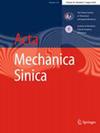Asynchronous deployment scheme and multibody modeling of a ring-truss mesh reflector antenna
Abstract
Mesh reflector antennas are the mainstream of large space-borne antennas, and the stretching of the truss achieves their deployment. Currently, the truss is commonly designed to be a single degree of freedom (DOF) deployable mechanism with synchronization constraints. However, each deployable unit’s drive distribution and resistance load are uneven, and the forced synchronization constraints lead to the flexible deformation of rods and difficulties in the deployment scheme design. This paper introduces an asynchronous deployment scheme with a multi-DOF closed-chain deployable truss. The DOF of the truss is calculated, and the kinematic and dynamic models are established, considering the truss’s and cable net’s real-time coupling. An integrated solving algorithm for implicit differential-algebraic equations is proposed to solve the dynamic models. A prototype of a six-unit antenna was fabricated, and the experiment was carried out. The dynamic performances in synchronous and asynchronous deployment schemes are analyzed, and the results show that the cable resistance and truss kinetic energy impact under the asynchronous deployment scheme are minor, and the antenna is more straightforward to deploy. The work provides a new asynchronous deployment scheme and a universal antenna modeling method for dynamic design and performance improvement.

 求助内容:
求助内容: 应助结果提醒方式:
应助结果提醒方式:


